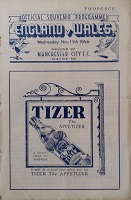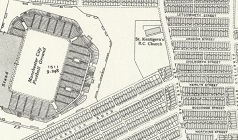|
|
|
flg.jpg)  "'OLD GUARD' TOO GOOD FOR WALES"
Daily Mirror "'OLD GUARD' TOO GOOD FOR WALES"
Daily Mirror |
 Officials Officials |
England |
UK ruling on substitutes |
Wales |
Referee
William E. Webb
Glasgow |
|
|
Linesmen
|
Robert Owen
Elay |
Rev.
Harold James
Pethybridge
36 (4 December 1909), Tipton |
|
|
|
flg.jpg) England
Team England
Team |
| |
|
Rank |
No official ranking system established;
ELO rating 4th |
Colours |
The 1946 home
uniform -
White collared jerseys, blue shorts, black socks with white
tops. |
|
P 3rd of eighteen, W 3 - D 0 - L 0 - F 11 - A
2. |
Captain |
George Hardwick |
Manager |
Walter Winterbottom, 33 (31 March 1913), appointed as FA national director of coaching/team manager on 8 July 1946; |
|
3rd of 13, W 3 - D 0 - L 0 - F 11 - A 2. |
Trainer: Laurie Barnett (Manchester City FC) |
P 3rd
of 139, W 3 - D 0 - L 0 - F 11 - A 2. |
|
Team chosen by Selection Committee headed by Arthur Drewry on Wednesday, 30
October, following the trial match between the FA XI and RAF XI in
Reading. |
flg.jpg) England
Lineup England
Lineup |
|
|
unchanged from the previous
two matches |
league position (30th October) |
|
|
|
Swift, Frank V. |
32
322 days |
26 December 1913 |
G |
Manchester City FC (FL2 7th) |
3 |
2ᵍᵃ |
|
2 |
Scott,
Lawrence |
29
204 days |
23 April 1917 |
RB |
Arsenal
FC (FL 19th) |
3 |
0 |
|
3 |
Hardwick,
George F.M. |
26
284 days |
2 February 1920 |
LB |
Middlesbrough FC
(FL 6th) |
3 |
0 |
|
4 |
Wright, William A. |
22
280 days |
6 February 1924 |
RHB |
Wolverhampton
Wanderers FC (FL 2nd) |
3 |
0 |
|
5 |
Franklin,
Cornelius |
24
293 days |
24 January 1922 |
CHB |
Stoke
City FC (FL 9th) |
3 |
0 |
|
6 |
Cockburn,
Henry |
25
60 days |
14 September 1921 |
LHB |
Manchester
United FC (FL 5th) |
3 |
0 |
|
7 |
Finney,
Thomas |
24
222 days |
5 April 1922 |
OR |
Preston
North End FC (FL 10th) |
3 |
2 |
|
8 |
Carter,
Horatio S. |
32
327 days |
21 December 1913 |
IR |
Derby County FC
(FL 16th) |
9 |
3 |
9
  |
Lawton, Thomas |
27
38 days |
6 October 1919 |
CF |
Chelsea FC (FL 12th) |
11 |
8 |
10
   |
Mannion,
Wilfred J. |
28
181 days |
16 May 1918 |
IL |
Middlesbrough
FC (FL 6th) |
3 |
5 |
|
the
135th (2nd post-war) brace scored |
|
11 |
Langton,
Robert |
28
66 days |
8 September 1918 |
OL |
Blackburn
Rovers FC (FL 13th) |
3 |
1 |
|
reserves: |
Jimmy Hagan (Sheffield United FC (FL
11th)) and
Harry Johnston (Blackpool FC (FL
TOP)) |
|
records: |
By
not conceding any goals, England have now kept four home clean sheets
in a row, a new record.
They have also equalled the record of not
conceding at home for 444 minutes. |
The England team trained at Southport 's Haig Avenue ground and were
staying at the de luxe Palace Hotel in Birkdale. They had dinner with
the Mayor and Mayoress of Southport on the day before the match.
|
|
|
|
2-3-5 |
Swift -
Scott, Hardwick -
Wright, Franklin, Cockburn -
Finney,
Carter, Lawton, Mannion, Langton. |
|
Averages: |
Age |
27
years 233
days |
Appearances/Goals |
4.3 |
1.5 |
|
|
|
 Wales
Team Wales
Team |
| |
|
Rank |
No official ranking system established;
ELO rating 11th to 12th |
Colours |
Made by Umbro -
Red jerseys with white collars, white shorts
with red side strip, red socks with white tops. |
|
Captain |
Billy Hughes |
Selection |
Selection Committee, led by Herbert Powell
on Thursday, 31 October 1946 |
 Wales
Lineup Wales
Lineup |
|
|
Sidlow, Cyril |
30
352 days |
26 November 1915 |
G |
Liverpool FC, England |
2 |
4ᵍᵃ |
|
2 |
Sherwood, Alfred T. |
23 |
13 November 1923 |
RB |
Cardiff City FC |
1 |
0 |
|
3 |
Hughes, William M. |
28
253 days |
5 March 1918 |
LB |
Birmingham City FC, England |
9 |
0 |
|
4 |
Witcomb, Douglas F. |
28
209 days |
18 April 1918 |
RHB |
West Bromwich Albion FC, England |
2 |
0 |
|
5 |
Jones, Thomas G. |
29
32 days |
12 October 1917 |
CHB |
Everton FC, England |
6 |
0 |
|
6 |
Burgess, W.A.
Ronald |
29
218 days |
9 April 1917 |
LHB |
Tottenham Hotspur FC, England |
2 |
0 |
|
7 |
Jones, W.
Ernest A. |
26
1 day |
12 November 1920 |
OR |
Swansea Town FC |
2 |
0 |
|
8 |
Powell, Aubrey |
28
208 days |
19 April 1918 |
IR |
Leeds United AFC, England |
2 |
0 |
|
9 |
Richards, Stanley V. |
29
296 days |
21 January 1917 |
CF |
Cardiff City FC |
1 |
0 |
|
only app
1946 |
|
10 |
Powell, Ivor V. |
30
131 days |
5 July 1916 |
IL |
Queen's Park Rangers FC, England |
1 |
0 |
|
11 |
Edwards, George |
25
346 days |
2 December 1920 |
OL |
Birmingham City FC, England |
2 |
0 |
|
reserve: |
originally Alf Sherwood |
|
team changes: |
Initially, two changes were
made on 11 November, Alf Sherwood replaced Ray Lambert (Liverpool FC)
at right-back and Ivor Powell replaced Bryn Jones (Arsenal FC) at
inside-left, both players being unfit.
Then the day before this match, Swansea Town's Trevor Ford dropped out because of
a pulled muscle to be replaced with Richards. |
|
The Welsh team were based in Knutsford. |
|
|
|
2-3-5 |
Sidlow -
Sherwood, Hughes -
Witcomb, T.Jones,
Burgess -
E.Jones, A.Powell,
Richards, I.Powell, Edwards. |
|
Averages: |
Age |
28
years 88 days |
Appearances/Goals |
2.7 |
0 |
|
|
|
|
Match Report
by Mike Payne |
|
 ENGLAND fought off the spirited challenge of the Welsh to gain at least a
share of the Home International Championship for 1946-47. Several times the
crowd were treated to the smooth rhythmic understanding of a team with so many
outstanding talents, although the typical Welsh tenacity made sure that they
knew that they had been in a very tough game. ENGLAND fought off the spirited challenge of the Welsh to gain at least a
share of the Home International Championship for 1946-47. Several times the
crowd were treated to the smooth rhythmic understanding of a team with so many
outstanding talents, although the typical Welsh tenacity made sure that they
knew that they had been in a very tough game.
An early goal is welcome in any game and it took England only
eight minutes to take the lead. Tommy Lawton sent a long raking pass out to
Bobby Langton on the left wing and Langton's cross was met by Raich Carter,
who scrambled it towards goal. Wilf Mannion was also in the area and helped
the ball on its way with a touch through Sidlow's legs. Although the ball was
cleared by Hughes, the referee had decided that it had already crossed the
goal-line.
Two good efforts by Ivor Powell then went close for Wales as
they hit back strongly. The first shot went over and the second was superbly
saved by Frank Swift. Then, with five minutes to go before half-time, England
scored a second goal to set Wales back on their heels. Fine work and passing
by Billy Wright, Carter and Mannion set up Lawton. The centre-forward needed
no second bidding and Sidlow was soon picking the ball out of his net.
In the second half, Wales tried everything they knew to get back into the
game. They threw everything at the home defence. Richards shot wide and Swift
again saved well, this time from a header by Aubrey Powell. For 15 minutes it
was all Wales but England weathered the storm and on 76 minutes they produced
another flash of brilliance to finally kill off the Welsh dragons.
Tom
Finney found Henry Cockburn with a pass in midfield and he, in turn, found
Lawton. Mannion then came from nowhere to speed through a gap to take the
final pass and settle the match with a good shot.
|
|
Match Report
by Norman Giller |
|
The Home International championship was considered
the most important tournament on the football calendar, and nearly 60,000 fans
attended Maine Road on a windy Wednesday afternoon in October 1946 to watch
England against Wales.
"Will o' the Wisp" Wilf Mannion scored two and
laid on the pass for a Tommy Lawton goal against a Welsh defence in which Alf
Sherwood was making his full international debut at right-back. Over the next
ten years he missed only one match for Wales. Frank Swift, playing in goal on
his home Manchester City ground, made half a dozen outstanding saves to break
the hearts of the Welsh forwards. England were nearly always in command
against the Welsh, but when they did break through Frank Swift showed just why
he was rated one of the world's great goalkeepers. Swiftie! What a player,
and what a man. He had huge hands like shovels and often used to walk around
the penalty area holding the ball with one hand as if it was a tennis ball. His reflexes were exceptionally quick for such a big man, and
his positioning was just about perfect. They say all goalkeepers are crazy,
and Frank certainly came into that category when he used to dive head first at
the feet of oncoming forwards. He was the bravest of the brave, and had the
full respect of not only his team-mates but always of opponents.
|
In
Other News....
|
It was on 12
November 1946 that 37-year-old, Emma Oxnard was found dead
in her bed in Newcastle upon Tyne by her sister. She had
been beaten and strangled, almost three weeks earlier. In
the meantime, her 38-year-old husband, Albert had been
sending letters and postcards to her sister from Blackpool, explaining that they had saved their marriage and would
be coming home soon. In reality, after his wife had refused to have sex
with him throughout their 16-year marriage, he had married another woman
in Poulton-le-Fylde, who was pregnant with his child. Two months after
the body was discovered, he was found guilty of murder and sentenced to
death, but he was given a reprieve by the Home Secretary, James Chuter
Ede, a few days before he was due to be hanged. Oxnard
served nine years in prison and he was reunited with his
second wife and son on his release.
|
|
|
|
|
Source Notes |
TheFA.com
Original newspaper reports
Wales' Complete Who's Who since 1946 |
|
Rothman's Yearbooks
Mike Payne's England: The Complete Post-War Record
Norman Giller, Football Author |
|
|
cgi |

